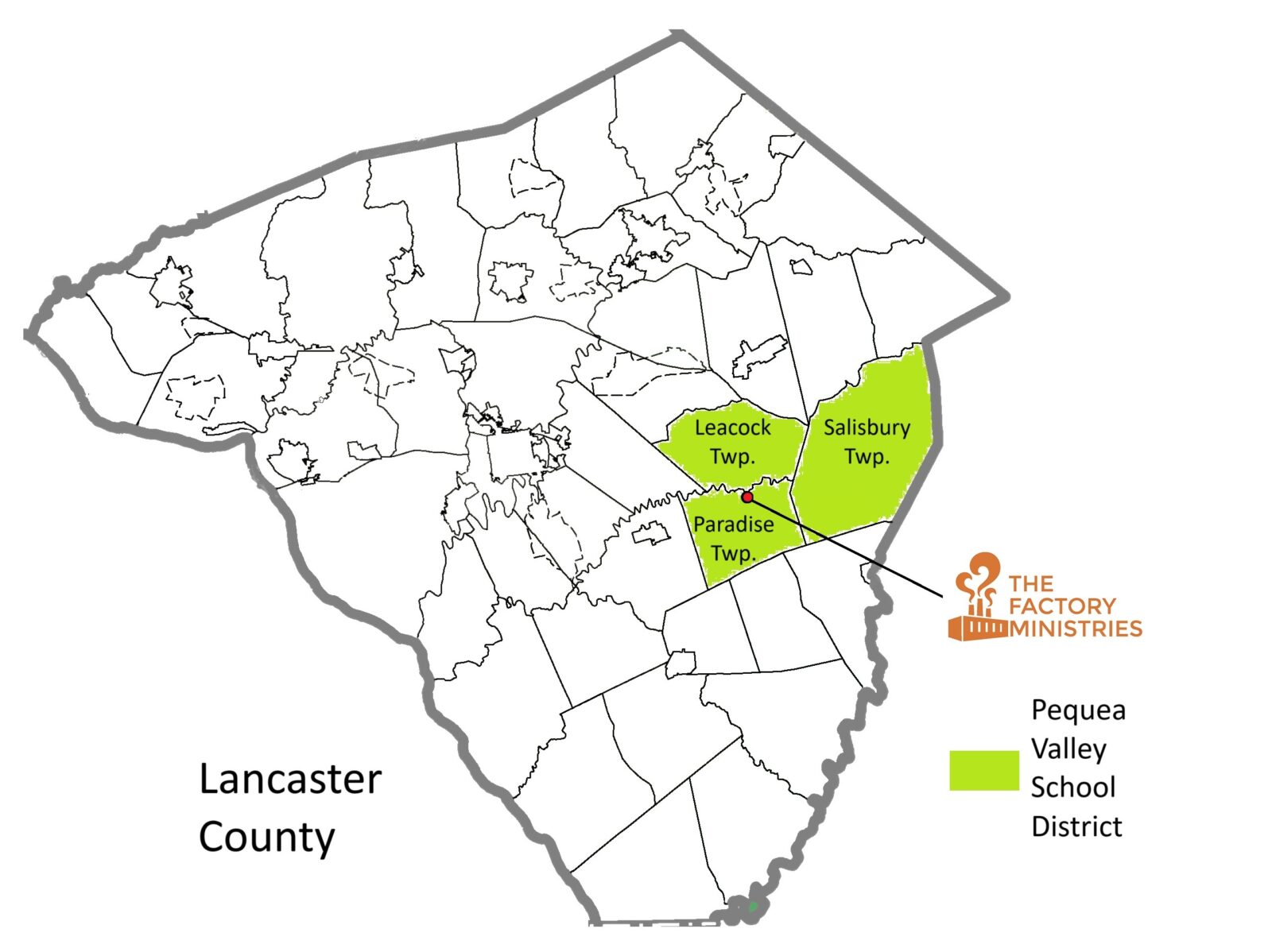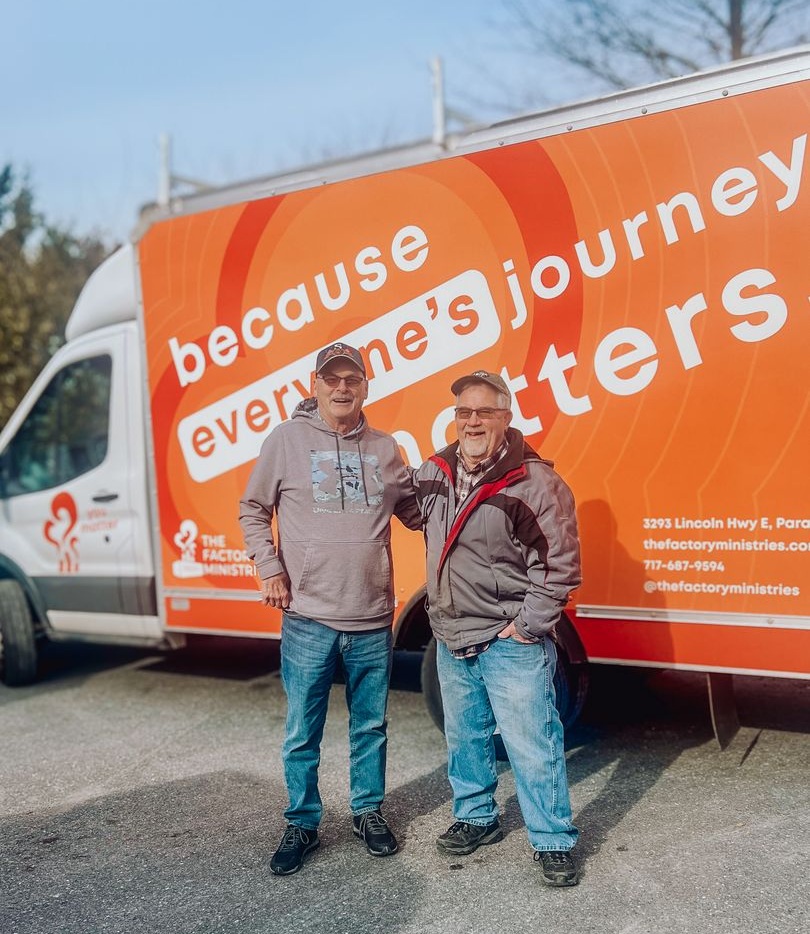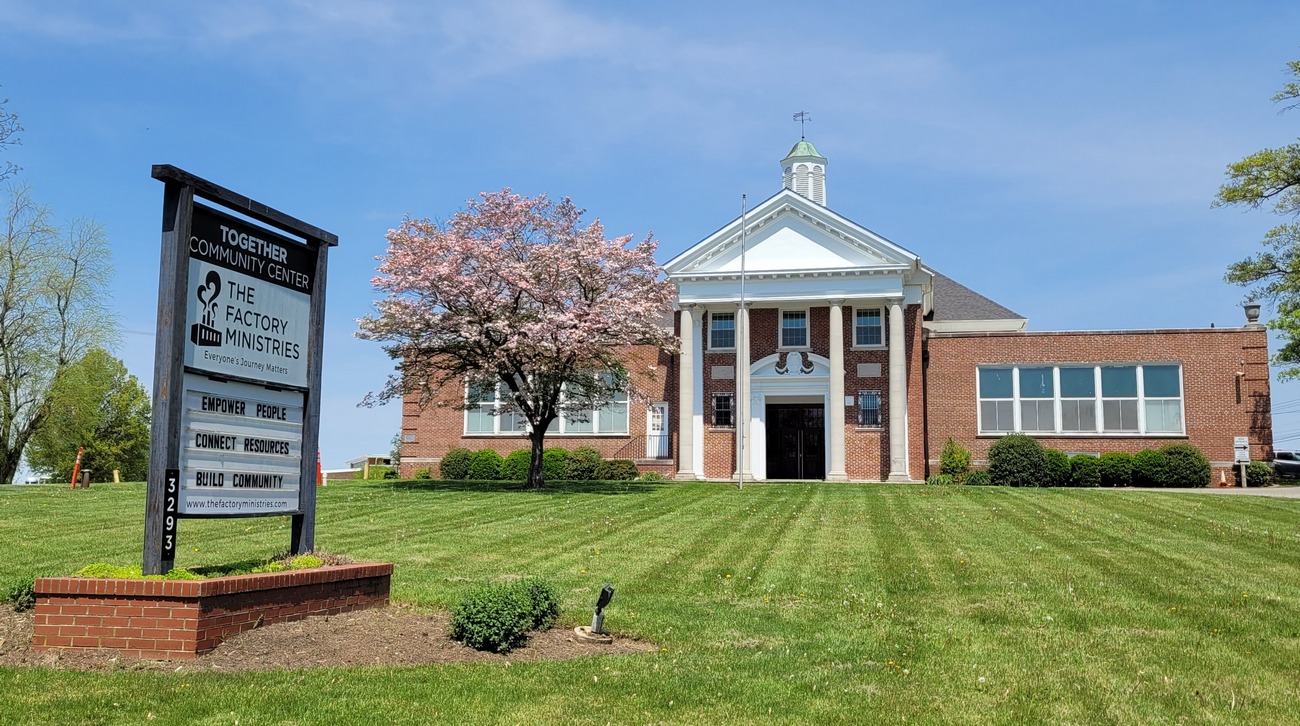Federal Funds and The Factory Ministries: A Closer Look at Local Impact
By Tim Stuhldreher in partnership with The Lancaster County Community Foundation
May 27, 2025
Our unique role as a community foundation allows us to hear directly from organizations on the front lines to learn first hand how federal initiatives are impacting us here in Lancaster County. To help connect our shared community with accurate information, we reached out to The Factory Ministries in Paradise, PA to understand how cuts to federal support impacts residents in eastern Lancaster County.
Adam Nagle thinks a lot about poverty. How people fall into poverty, and how to help them out of it. How people perceive it, versus the reality.
Nagle is the executive director of The Factory Ministries, a faith-based social services hub fighting poverty in eastern Lancaster County. Its mission is threefold: to empower people, connect resources, and build community.

Adam Nagle, Executive Director of The Factory Ministries (Photo by Tim Stuhldreher)
“We believe the best way to address poverty is to empower individuals with tools and resources through relationship,” the organization says.
About 10% of its roughly $2 million budget comes from the federal government. When asked if that money helps The Factory Ministries and makes it more effective, Nagle responded “Yes — with five exclamation points behind it!”
In his view, it’s a positive thing for government to extend help to those who are vulnerable. He sees it as consistent with, and indeed a reflection of, core Christian concepts of charity and respect for human dignity.
“It is a Christian notion, the way I look at the world, to care for the vulnerable, the marginalized, those who don’t have resources and power,” he said.
Here’s a look at The Factory Ministries and how its work could be impacted by the ongoing budget discussions in Washington, D.C.
What kind of community does The Factory Ministries serve?
The Factory Ministries operates in the Pequea Valley School District, which comprises three townships: Leacock, Paradise and Salisbury townships. The total population is around 23,000.
The area is home to some of Lancaster County’s most beautiful and productive farmland and highest concentrations of Plain Sect households.
 As for Pequea Valley School District, it comprises two elementary schools, a middle school and a high school. Enrollment is around 1,300 students, down from nearly 1,700 a decade ago. Over the same period, the number of English language learners has grown from 22 to more than 100.
As for Pequea Valley School District, it comprises two elementary schools, a middle school and a high school. Enrollment is around 1,300 students, down from nearly 1,700 a decade ago. Over the same period, the number of English language learners has grown from 22 to more than 100.
What kinds of needs are there in the community?
An estimated 1,300 people or so live below the poverty line, according to U.S. Census data. That’s a poverty rate of 5.7%, somewhat lower than the overall county rate of 8.6%. Another 27% of households in the three townships are economically precarious, according to the United Way’s “ALICE” metric, (Asset Limited, Income Constrained, Employed). ALICE households earn above the Federal Poverty Level (FPL), but make less than what’s needed to afford basic essentials. They may struggle to make ends meet, or be one unexpected expense away from crisis.
Enrollment in Medicaid, which provides health insurance to low-income and vulnerable individuals, is around 3,000, or 13%; of those, nearly half are under 21, according to state data.
About 1,600 residents, or 7%, are enrolled in SNAP, the Supplemental Nutrition Assistance Program, according to census and state data. Paradise Township has high food insecurity, according to the Central Pennsylvania Food Bank’s Hunger Mapping Project, with a rate above 9%. The other two townships are below 6%.
In Pequea Valley School District, the number of students considered economically disadvantaged and qualifying for free or reduced-price lunches has grown from 34% in 2010-11 to 59% now. Meanwhile, as of this spring, 60 students in the district are considered homeless, district officials said. That means they meet the standard of the federal McKinney-Vento Act, which includes children living in shelters, hotels, cars and the like, and children sharing other families’ housing due to eviction or economic hardship.
How does The Factory Ministries help?

Children taking part in Brave Kids programs at The Factory Ministries. (Photo from The Factory Ministries)
Starting in the 1990s as a youth center, The Factory Ministries has grown to provide a wide range of social services. Currently it has 15 staff members, supported by numerous volunteers. It is headquartered at the former Paradise Elementary School at 3293 Lincoln Highway East, just west of Gap.
Many of its programs are youth-focused: It starts there “because thriving children means a flourishing community both now and for generations to come.” Programs cover all ages, from home visits during a mother’s pregnancy through pre-K and elementary school programs to teen homework clubs, mentoring and summer camps.
Its other offerings include The Factory Market food pantry; programs addressing housing insecurity, including short-term “crisis housing” for people in acute need; and “adult advocacy,” which includes connecting clients to resources, fostering life-skills development and providing support for domestic violence victims.
In 2024 alone, the nonprofit served 818 individuals at The Factory Market; 309 children and 83 caregivers through its Elementary and Early Learning programs; and 207 teens through its Open Door Night and After School Club. Adult advocacy programming served 353 individuals, while domestic violence services sheltered three women and eight children, keeping them safe and helping them rebuild after trauma.
How does federal aid support the nonprofit’s work?
The majority of the federal funding that The Factory Ministries receives is “pass through” — that is, in the form of grants or reimbursements provided through contracts with other organizations. Much of it is U.S. Department of Housing & Urban Development (HUD) money for housing programs.

The Factory Market is staffed by volunteers. Neighbors shop on their own and pay with Factory Bucks earned through participating in the organization’s programs. (Photo from The Factory Ministries)
About $47,000 in HUD funds for housing comes from the Lancaster County Homelessness Coalition, Factory Ministries Director of Adult Services Shira Zimmerman said. Another $50,000 comes from Community Action Partnership of Lancaster County for The Factory Ministries’ Bridge House, which serves domestic violence survivors. Other funding goes toward case management and various additional services.
Just under $200,000 in HUD Community Development Block Grant (CDBG) money is going toward The Factory Ministries’ $1.82 million headquarters renovation, helping the nonprofit to adapt the former school building to its new role.
Among other things, the renovation is intended to create space for an on-site Head Start program that The Factory Ministries hopes to launch in partnership with CAP. It’s a program for which there is incredible need, Nagle said.
Head Start is supported by the U.S. Department of Health & Human Services; it would provide about $675,000 in annual funding for the program at The Factory Ministries, CAP spokeswoman Kristy Aurand said.
Nonprofits are always looking to make their budgets stretch further, Nagle said. Every dollar of federal money frees up another dollar that Factory Ministries can put toward another service or program.
What funding is at risk?
Housing
The federal administration’s “skinny budget” — a preliminary document that serves as a starting point for budget negotiations — proposes cutting HUD’s discretionary budget by $32.3 billion, or 44%. The CDBG program would be eliminated entirely.
The administration says states should design their own housing support programs and that funding nonprofits has allowed them to pursue radical agendas. Opponents of the cuts say the federal government has an essential role to play in housing and that the cuts risk pushing many more people into homelessness.
Nagle said housing insecurity has become a much bigger issue in eastern Lancaster County in the past few years. Before the pandemic, there might be two or three families living in their car at a given time; at one point this past winter, there were 17. Federal money helps the nonprofit provide assistance.
HUD money enables the nonprofit to keep its day center open full time during business hours, allowing homeless individuals to stay warm in winter and cool off in summer. It also helps The Factory Ministries serve Pequea Valley’s homeless students and their families and keep them housed in the local community. That’s tremendously important, Nagle said — not only to preserve the continuity of the children’s education and connections, but to keep costs down for the district, which is legally obligated to bus any students forced to relocate out of the area to and from school at its own expense.
Head Start
The uncertainty about the future of Head Start is adding another challenge. While initial reports from the federal government proposed eliminating Head Start, cuts are not in current budget proposals and there has been no action to date. Still, advocates remain apprehensive that funding could be pared back.
Opponents of Head Start say it is wasteful and its benefits fade out over time. Advocates cite research suggesting otherwise, and say the answer is to improve it, not end it. Well-designed programs, they say, can more than pay for themselves, as participants tend, on balance, to grow into adults who earn higher wages, stay out of jail and can provide for themselves without social services.
Student assessments show that The Factory Ministries’ early learning programs improved kindergarten readiness by 33% over five years. Nagle said he’s worried that the funding battle could impact the pending Head Start partnership with CAP.
Are there other proposed cuts that would have indirect effects?
The Congressional Budget Office estimates that the budget reconciliation bill under discussion in the U.S. House would cut Medicaid spending by $625 billion over 10 years through work requirements and other eligibility changes. It says that would increase the number of uninsured by 7.6 million or more. Additionally, the bill would shift more of the cost for SNAP to states.
Medicaid cuts could certainly have implications for local families’ health and economic wellbeing. Moreover, they would impact The Factory Ministries’ efforts to bring more mental health services to the community. It’s essential that providers accept Medicare and Medicaid, Nagle said — otherwise, their services will be out of reach for The Factory Ministries’ clientele.

The Factory Ministries truck travels around the area, picking up donations for the Factory Market. (Photo from The Factory Ministries)
As for SNAP, eastern Lancaster County is a farming community, and a generous one, so Nagle thinks many people would be able to adjust if SNAP were pared back. Still, there’s a chance it could increase food insecurity, especially for individuals who have difficulty reaching a food pantry, such as the elderly, the disabled or those without a vehicle.
“We love SNAP,” he said. “I’d hate to see it cut.”
But wouldn’t the cuts serve a larger good, by reducing dependence and encouraging self-reliance?
When people are asked about the causes of poverty, they almost always focus on personal choices and personal responsibility, Nagle said. Stay in school. Get a job and work hard. Make better choices.
No doubt, that’s part of the picture, he said. But structural factors play a role, too — the myriad ways in which the world around us makes it easier to flourish, or harder.
Many people struggling with poverty have jobs — or two or three — but make too little to live on. Constraints on residential construction drive housing prices higher and higher. Payday lending and other forms of financial exploitation stymie efforts to build wealth.
Beyond a certain point, a helping hand becomes a virtual necessity if someone is to get back on their feet. Nagle cited one of The Factory Ministries’ proudest success stories: Housing a woman who had been living in her car for 16 years. It would be unreasonable to expect her to achieve that on her own; chronic homelessness of that duration is typically irreversible.
Or take The Factory Ministries’ many programs focused on early childhood education and youth development. That’s a form of poverty prevention: Giving children and their families the tools they need up front to lead healthy, productive lives.
Does accepting federal funding risk compromising The Factory Ministries’ faith-based mission?
Not at all, Nagle said. On the contrary, it allows the nonprofit to do more and be more effective.
To be sure, The Factory Ministries is careful. It reviews the terms and conditions that come with grants before accepting them. If there are concerns — and sometimes there are — its team talks things over with the prospective funding agency. The nonprofit would not hesitate to decline a grant if it came to that, Nagle said.

The Factory Ministries.
Faith motivates The Factory Ministries, spokeswoman Ellie Green said, but it is in no sense a limiting factor or criterion. All are welcome. Anyone can receive services, regardless of personal beliefs, faith or religion, and the same goes for anyone who shares The Factory Ministries’ vision of community betterment and wants to pitch in.
Nagle said his perspective is reflected in an Old Testament passage: Jeremiah 29:11. It’s addressed to the Israelites during the Babylonian exile. It advises them: “Seek the welfare of the city where I have sent you … for in its welfare you will find your welfare.” He sees that as a call to cooperation.
He said he’s talked with community members who support slashing federal aid. He said he agrees 100% on eliminating waste, fraud and abuse — who wouldn’t? But he wants people to understand the full picture, including all the good that is done in the community using federal dollars.
“We are keen to have conversations,” he said. By and large, he said he has found a lot of common ground.
Federal Action, Local Impact
Connecting our shared community with accurate information about recent federal funding cuts by compiling stories and data from a variety of sources.
Meet Community Action Partnership
Take a deeper dive into how federal funding cuts put critical services for neighbors throughout the region at risk by hearing directly from Lancaster County’s largest anti-poverty organization.
